Baby Acne
Baby acne is a skin issue in babies which is not permanent. It shows on the baby’s face or anywhere in the body which looks like small red or white dots. Some call it acne because the appearance can be pimple-like. As for baby acne treatment, most babies don’t necessarily need one as it goes away on its own. It is also referred to as neonatal acne, and more or less 20% of newborn babies develop this skin condition.

Infantile Acne
Infant acne or infantile acne is distinct from baby acne. It can display symptoms like blackheads which are not present in baby acne. Infantile acne may also form as cysts, and without proper treatment, it can produce scarring. Baby acne appears for the first few months of the newborn while infantile acne can last up to the child’s toddler age. Also, the latter is a rare occurrence.
Cause Of Baby Acne
Specialists have not yet determined the exact cause of baby acne. They are leaning towards medical reasons like hormonal imbalance on the mother or the baby.
Symptoms Of Baby Acne
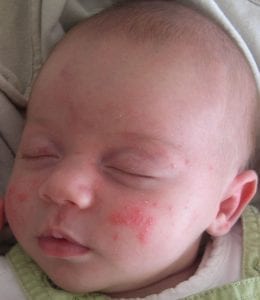

Are you familiar with acne on teens and adults? Well, baby acne is somewhat like that except it grows on newborn babies. These growths are sometimes red or white, and it may appear like lumps or pimples. These whitish or reddish eruptions will also have something inside it like whiteheads.
The baby acne may appear anywhere on the newborn’s face, but it is regularly seen on the cheeks of the babies. Some also have the baby acne on their necks and backs.
At times, the acne is very visible when your baby is in tears. It is also believed that the acne can get irritated with rough clothing. Saliva of other people or the baby’s and vomit can also worsen the condition.
Some mothers are concerned since baby acne appears as soon as the baby is given birth. For others, the acne comes out after two weeks. It can stay briefly for about a few days or weeks, but for some, it can be a problem which lasts for a few months.
What Skin Conditions May Appear Like Baby Acne?
Eczema
Eczema is a skin disorder or a dermatitis issue which looks a bit like baby acne since it forms red lumps all over the baby’s face. It can also grow on the baby’s knees and elbows once the young one ages. But unlike baby acne, the baby can get the infection out of eczema, and it will form yellowish crusts. It can also get worse if your baby starts to learn how to crawl because of friction with the knees and elbows. Commonly, eczema is also called atopic dermatitis.
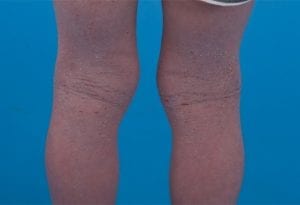

Seborrheic eczema is also another type of eczema. Doctors most often misdiagnose baby acne with seborrheic eczema or seborrheic dermatitis. It is also called cradle cap.
How To Treat The Symptoms Of Eczema
While eczema is a permanent skin condition and the only way to treat it is to manage the symptoms, there is still a relief from it. You can purchase organic creams or over-the-counter products like VaniCream or Aquaphor. Some doctors provide prescriptions if necessary. Another way to lessen the triggers of eczema is to get rid of all foods that your baby may be allergic to, and it is a must to give him probiotics every single day.
Erythema Toxicum
Erythema Toxicum is one of those skin conditions in babies that looks like a red rash, with tiny lumps on the skin and some reddish spots too. The bumps appear on the baby’s face, torso, and his limbs as well. After the baby is born, the lumps develop, but it usually goes away in a few days. The condition is not dangerous at all.
Milia
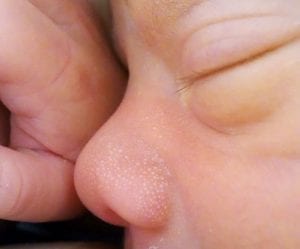

Milia is a skin problem which shows small lumps that are usually white all over the face of the baby. These are dead or dry skin cells which are trapped within the skin. Milia develops on a baby after two to four weeks of birth. It is not in any way baby acne and treatment is not necessary.
Treatment For Baby Acne
Generally, there is no need to treat baby acne. It will just go away on its own after a few weeks. But there are times when babies suffer from baby acne for a long time. Some babies have it for months, and it’s not a pleasant sight to see. What can you do?
You have to visit your pediatrician for the proper medication or prescription. He will most probably give a medicated ointment, cream or lotion so that the acne will be cleared up.
A word of caution – do not use over-the-counter acne creams, facial cleansers or body lotions on your baby. It may work for you, but the baby’s skin is ultra-sensitive. Some active ingredients in these treatments may harm your baby. It may worsen the baby acne, or infection may develop. The surface can also get irritated with the components of OTC products.
How About At-Home Remedies For Baby Acne?
You need to understand that baby acne is just a passing phase. It will clear up eventually, and while waiting for it to go away, you can perform some treatments at home for your baby’s skin.
Always Keep The Baby’s Face Clean And Fresh.
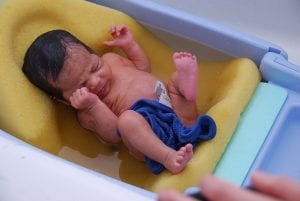

Wash the face of your baby with some lukewarm water. Be careful with the hot water since it can burn the baby’s skin. To do a test, dip your elbow on the water, and if it’s not that warm, your baby will be able to take it. Do this during bath time. There is no need for you to use baby soap or soap-free cleanser since cleaning the face will only require water. Consult your dermatologist or a pediatrician for the best cleanser. It would also be best to use fragrance-free skin products for our baby.
Don’t Use Harsh Products.
You have to avoid ingredients like Retinoid or Erythromycin since these active ingredients are for adult acne treatment. They are not for babies. Stay away from scented soaps, aromatherapy baths, and the likes.
Avoid Lotions And Creams.
Again, don’t use lotions or creams on the baby. It will irritate the skin and acne is most likely to worsen.
Scrubbing The Acne Part Is Not Advisable.


It’s not necessary to scrub the part where the baby acne has developed. You can stroke the part with a baby towelette very gently. To dry, pat with a clean towel.
Never Squeeze The Baby Acne.
Stop squeezing or pinching the part where the acne is located. It will irritate and may infect the skin.
Should I See A Doctor Now?
You have to understand that baby acne has no definite treatment, but yes, you have to go to your pediatrician for a check-up. The doctor can tell you all about baby acne for your peace of mind. Ask all the questions you have about the baby acne condition and anything concerning your baby’s health (read further at mayoclinic).
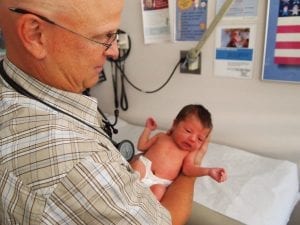

Note: If your baby has blackhead, lumps with pus in it, or abnormal inflammation of the skin, visit your doctor right away. You will see that the lumps are causing discomfort on your child and he will be crying. If this happens, the doctor may prescribe a benzoyl peroxide cream with 2.5% concentration. In very rare occasions, antibiotics are also given. When this happens, there must be an underlying problem which can stretch up to his puberty years. The doctor will know what to do with this.
Underlying Conditions
Speaking of underlying problems, baby acne with rare conditions may not react well with home remedies. It may have a connection with tumors, adrenal disorder or endocrine system problems. If you have a baby girl and she manifests symptoms of hyperandrogenism, go to your doctor immediately. Common signs are very oily skin and too much facial hair.
Other Resources
https://www.webmd.com/skin-problems-and-treatments/acne/picture-of-baby-acne
https://www.verywellhealth.com/newborn-baby-acne-15497
https://www.medicalnewstoday.com/articles/324234
Last Updated on January 12, 2023 by Rejie Salazar
DISCLAIMER (IMPORTANT): This information (including all text, images, audio, or other formats on FamilyHype.com) is not intended to be a substitute for informed professional advice, diagnosis, endorsement or treatment. You should not take any action or avoid taking action without consulting a qualified professional. Always seek the advice of your physician or other qualified health provider with any questions about medical conditions. Do not disregard professional medical advice or delay seeking advice or treatment because of something you have read here a FamilyHype.com.